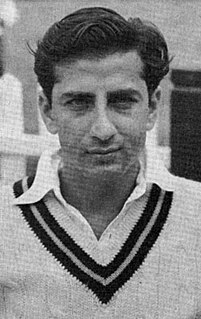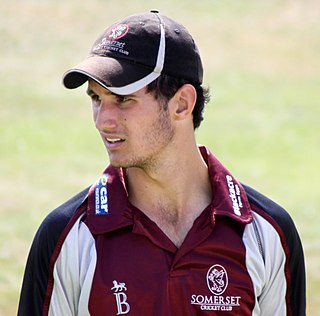
Mushtaq Ahmed Malik is a Pakistani former cricketer who currently acts as the spin bowling coach for the West Indies cricket team. A leg break googly bowler, at his peak he was described as being one of the best three wrist-spinners in the world. In an international career that spanned from 1990 until 2003, he claimed 185 wickets in Test cricket and 161 in One Day Internationals. He was at his most prolific internationally between 1995 and 1998, but his most successful years were as a domestic player for Sussex in the early 2000s.

Fazal Mahmood, was a Pakistani cricketer. He played in 34 Test matches and took 139 wickets at a bowling average of 24.70. The first Pakistani to pass 100 wickets, he reached the landmark in his 22nd match.
Duncan Albert Sharpe is a former Pakistani cricketer who played in three Tests in 1959–60. Sharpe is of Anglo-Indian heritage and was the third of the four Christians who have played Test cricket for Pakistan.

Niaz Ahmed Siddiqi was a Pakistani cricketer who played in two Tests in 1967 and 1969. He was the only East Pakistani to play Test cricket for Pakistan.
The Peshawar Club Ground is a cricket ground in Peshawar, Pakistan, used for one Test match between India and Pakistan. It staged first class cricket matches from 1938 to 1987.
This article describes the history of cricket in Pakistan from 1947 to 1970.
Brent Avis Hardcastle Palfreyman is a former Australian first-class cricketer who played for Tasmania.
The England national cricket team, organised by Marylebone Cricket Club (MCC), toured India, Pakistan and Ceylon from October 1961 to February 1962. They played five Test matches against the India national cricket team, with India winning two matches and the other three being drawn; and three Tests against the Pakistan national cricket team, with England winning the first match and the other two drawn. The itinerary was unusual in that England began in Pakistan with three matches, including the first Test at the Gaddafi Stadium in Lahore, and then went on an extensive five-Test tour of India before crossing into East Pakistan, where they played their second Test against Pakistan at the Dacca Stadium in Dacca. For the third Test against Pakistan, they travelled to the National Stadium, Karachi before completing the tour in February with three games in Ceylon. Ceylon (now Sri Lanka was not a Test-qualified team at that time and played a single first-class match against MCC in Colombo which was won by MCC.

Lewis Gregory is an English cricketer who plays for Somerset County Cricket Club. A right-handed batsman and right-arm seam bowler, Gregory made his senior cricket debut in 2010, representing Somerset against the touring Pakistanis.
Between the 1954–55 and 1970–71 seasons, 13 first-class cricket teams from East Pakistan played in the Pakistan domestic cricket competitions, the Quaid-i-Azam Trophy and the Ayub Trophy. With the creation of Bangladesh in 1971, this participation ended. An East Pakistan Governor's XI also played a first-class match against the touring International XI in 1961-62.
Mohammad Abdul Latif, also known as Mohammad Abdul Latif Khan and M.A. Latif, is a former first-class cricketer for East Pakistan, a retired senior officer in the Bangladesh armed services, and a cricket administrator.
Asif Ahmed is a former Pakistani cricketer who played first-class cricket from 1960 to 1972.
An English cricket team sponsored by Marylebone Cricket Club (MCC) visited Pakistan from December 1955 to February 1956 and played fourteen first-class matches including four against the Pakistan national cricket team.
Fitzroy Bertram Crozier is a former cricketer who played first-class cricket for Ceylon from 1957 to 1967.
Sadanand Namdeo Mohol is a former medium-fast bowler who played first-class cricket in India from 1960 to 1971. He toured England in 1967, but did not play Test cricket.
Munawwar Hussain is a former cricketer who played first-class cricket in Pakistan from 1961 to 1975.
The Ceylon cricket team toured Pakistan in November 1966. Ceylon did not then have Test status, but three five-day unofficial Tests were played, Pakistan winning all three by large margins in only four days. The tour also included two other first-class matches before the unofficial Tests.
B. W. R. Thomas is a former cricketer who played for Ceylon in the 1960s.









